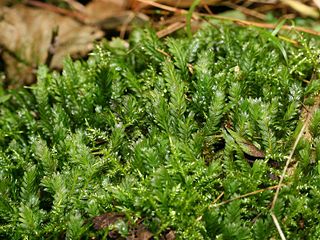
Fissidens adianthoides, the maidenhair pocketmoss, is a moss in the family Fissidentaceae. It was first collected by Hedwig in 1801.

Pleurozium schreberi, the red-stemmed feathermoss or Schreber's big red stem moss, is a moss with a loose growth pattern. The root name pleuro comes from the Latin for ribs, possibly describing how the parts branch from the stem.
Rhytidiadelphus triquetrus, the big shaggy-moss or rough goose neck moss, is a species of moss in the family Hylocomiaceae. It is often the dominating moss species in moderately rich forest habitats in the boreal regions and the Pacific Northwest. Because of its fuzzy appearance and tail-like shape it is also called the 'electrified cat's tail moss'. Not to be confused with square goose-necked moss, Rhytidiadelphus squarrosus.
NVC community W9 is one of the woodland communities in the British National Vegetation Classification system. It is one of the six communities falling in the "mixed deciduous and oak/birch woodlands" group.
NVC community W11 is one of the woodland communities in the British National Vegetation Classification system. It is one of the six communities falling in the "mixed deciduous and oak/birch woodlands" group.
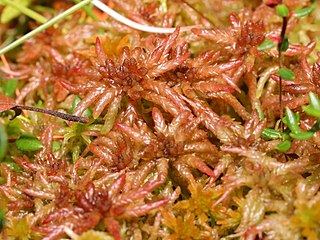
Sphagnum magellanicum, commonly called Magellanic bogmoss, Magellan's sphagnum, Magellan's peatmoss or midway peat moss, is a widespread species of moss found in wet boreal forest in the far south and southwest of South America, North America and Eurasia.
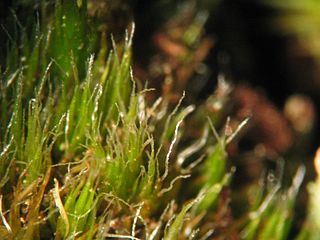
Campylopus introflexus, also known as the heath star moss, is a species of moss. The first description of the species was made by Johannes Hedwig as Dicranum introflexum in 1801.

Rhytidiadelphus squarrosus is a species of moss known as springy turf-moss in the United Kingdom, and square goose neck moss in the United States. It is widespread in Eurasia and North America, and has been introduced to the Southern Hemisphere. It has broad ecological tolerances, and is usually found in man-made habitats such as lawns and golf courses. It is most closely related to R. subpinnatus, with which it is often confused.

Fern moss may refer to several varieties of moss that produce feathery fronds and can form a moss carpet across grass or bare patches of ground:
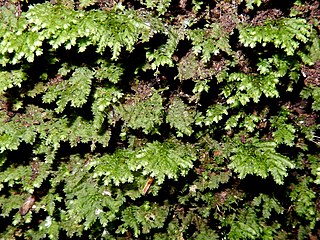
Hypopterygium is a genus of moss in the family Hypopterygiaceae. It contains the following species:
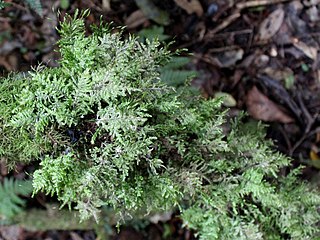
Eurhynchium praelongum is a species of moss with a widespread distribution. Found in Australia, New Zealand, North America, northern South America, Eurasia and North Africa .

Moss lawns are lawns composed of moss, which occur naturally, but can also be cultivated like grass lawns. They are a defining element in moss gardens.

Warnstorfia fluitans, the floating hook-moss or water hook-moss, is a species of moss found in acidic habitats across all continents except Antarctica.

Sphagnum contortum is a species of moss reported in North America and Europe. NatureServe marked its global conservation status as Secure.

Sphagnum denticulatum is a species of moss belonging to the family Sphagnaceae. It is widely distributed in Europe but it is also found in other parts of the world.
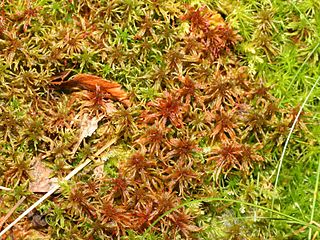
Sphagnum warnstorfii is a species of moss belonging to the family Sphagnaceae, named in honour of Carl Warnstorf. It is widely distributed in the north hemisphere.

Philonotis seriata is a species of moss belonging to the family Bartramiaceae. It is widely distributed in Europe but it is also found in other parts of the world.
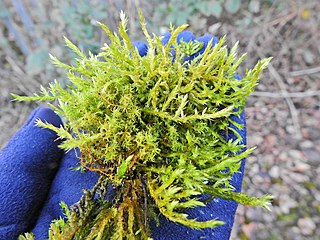
Calliergonella cuspidata is a species of moss belonging to the family Pylaisiaceae. It is widely distributed around the world.

Hypnum jutlandicum is a species of moss belonging to the family Hypnaceae. It is widely distributed in Europe and the Aleutian islands but it is also found in other parts of the world.
















